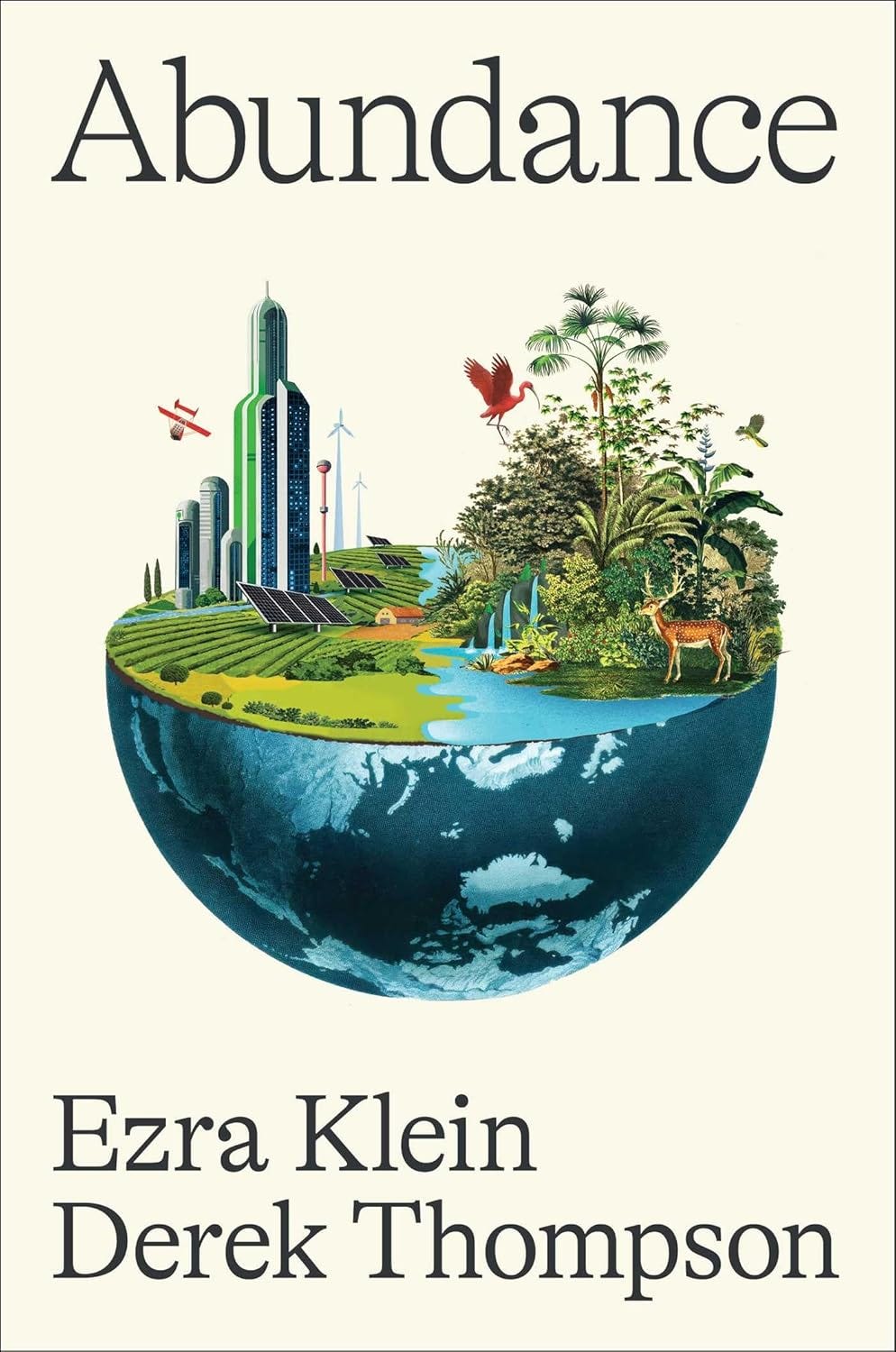Good afternoon!
This past week, I read two books: one that looks to the future—the buzzy nonfiction policy book Abundance by Ezra Klein and Derek Thompson—and one that looks to the past—Glorious Exploits by Ferdia Lennon, a historical fiction novel set during the Peloponnesian War in the 5th century BCE. Let’s get into it.
read📖→
Abundance by Ezra Klein and Derek Thompson
Abundance is a nonfiction policy book that examines how the American left has fallen short on delivering key initiatives, such as affordable housing, healthcare, transportation, innovation, and green energy. According to Klein and Thompson, liberals have hamstrung themselves through overregulation, making such projects impossible. Their solution is a “liberalism that builds.”
Overview: Abundance begins by examining how the world has changed over the course of just a few decades. For instance, between 1875 and 1905, several significant inventions emerged, including automobiles, bicycles, rubber-soled shoes, cardboard boxes, aspirin, Coca-Cola, airplanes, American hamburgers, and basketball. Someone from 1875 couldn’t have imagined what the world looked like just thirty years later.
However, our current physical world bears a striking resemblance to that of 1990, apart from the emergence of phones and computers. Where is our Jetsons’ future? Where are our high-speed rail networks? Hovering cars? Or even just the housing projects that have been in the works for decades? Or better healthcare?
To answer these questions, Klein and Thompson take a harsh look at the American left. While liberals like to blame the right for blocking their initiatives and pushing for small government, Klein and Thompson argue that liberals have gotten in their own way. They critique the right as well, but this book is addressed to American liberals. Abundance examines a short historical perspective, including examples from the late twentieth century, although the book is primarily anchored in the problems of the present.
Klein and Thompson assess two sources of failure—overregulation and a failure to encourage innovation.
The left’s overreliance on regulation and procedural requirements has impeded much-needed progress. Klein and Thompson argue that environmental regulations, outsourcing to nonprofits and consultants, and onerous requirements for government contracts (pushing for women or minority-owned contractors) have stalled projects.
A lack of affordable housing is a key illustration of the consequences of this overregulation. Houston, in red Texas, “has lowest homelessness rate of any major US city.” Klein and Thomas largely attribute this to the fact that Houston enjoys low housing costs and does not have zoning laws. In comparison, it can take years just to obtain permits in San Francisco—a 2023 state report “found that it took 523 days, on average, to get clearance to construct new housing, and another 605 days to get building permits.”
Ironically, environmental regulation has stymied building projects in blue states like California. California legislators have been discussing high-speed rail for decades, but the reviews necessary to assess the high-speed rail project’s impact began in 2012 and have yet to be completed.
Part of the reason for this is that the left has a “procedure fetish.” This movement began in the 1960s and 1970s, with individuals like Ralph Nader suing the government to effect change. Nader wrote a book in the 1960s attacking car manufacturers and urging them to increase their safety protocols. The book was a national success, helping to lead to President Johnson’s signing of the Highway Safety Act and the National Traffic and Motor Vehicle Safety Act.
Nader then recruited scores of young lawyers, known as “Nader’s Raiders,” who sued the government into oblivion. This strategy had far-reaching effects. As Klein and Thompson explain:
Nader and his Raiders believed in government. They defended it from conservative assault. When they criticized it—when they fought it, sued it, restrained it—they did so to try to make it better. But those same laws and processes were available for anyone else to use, too. You can bog clean energy projects down in environmental reviews. You can use a process meant to stop the government from building a highway through your town to keep a nonprofit developer from building affordable housing down the block. “It was as if liberals took a bicycle apart to fix it but never quite figured out how to get it running properly again.”
Another key issue is that the government hasn’t done enough to encourage innovation. During World War II, American scientists invented critical technologies through the Office of Scientific Research and Development (OSRD). Scientists “invented radar, invested in malaria treatments, developed an early influenza vaccine, and built the foundations for early computing.”
Klein and Thompson argue that innovation has stagnated in part because of the onerous requirements of government grant programs. Scientists can spend up to 40% of their time on grant administration. Klein and Thompson stress that the grant system has become administratively burdensome, and grantors have become risk-averse. Scientists also often lack the necessary support to bring their innovations into mass production.
Klein and Thompson offer some solutions, but the book is ultimately not a “policy wishlist.” As they write, “what we are proposing is less a set of policy solutions than a new set of questions around which our politics should revolve. What is scarce that should be abundant? What is difficult to build that should be easy? What inventions do we need that we do not yet have?”
Opinion: I’m not an Ezra Klein superfan by any means, but I read his articles and listen to his podcasts every so often. In general, his takes on “supply-side progressivism” have resonated with me, so I was interested in reading this book.
It might seem odd to be reading this type of policy book when the U.S. is facing eye-watering tariffs. However, in the U.S., both political parties are at inflection points, and both parties must grapple with obstacles to progress and development. While Klein and Thompson are directly addressing liberals, the arguments in this book will likely resonate with conservatives as well, given that deregulation has been a long-standing conservative talking point. The people who are likely to criticize Abundance the most are scarcity-oriented environmentalists.
I won’t criticize their political ideas or arguments, as this is a policy book, but I will point out a few general criticisms I have with Abundance. Klein and Thompson explicitly address the left and urge Democrats to redefine their party. They take pains not to alienate the liberals that they are speaking to, which sometimes results in awkward arguments. As another reviewer notes, “Klein and Thompson never spare the opportunity to pull a punch.” At times, I wish they would let go of these mental gymnastics and be more critical of their audience. There’s also a lot that Klein and Thompson leave out, including the role of conservatives.
A potential pitfall of this type of policy book is that writers tend to flatten explanations to fit their examples under one umbrella. I think Klein and Thompson tend to oversimplify the arc of the late twentieth century. In their view, the U.S. has transitioned from a country with low administrative requirements to one with a high administrative burden, thereby hindering progress and depriving us of the Jetsons’ future we were promised.
But isn’t this a worldwide phenomenon? Sure, other countries have high-speed rail networks, and China can build a hospital in ten days, but the physical environments of other countries don’t look radically different than those of the United States. If other countries that don’t have the U.S.’s onerous regulation requirements are also facing similar challenges to progress, what other explanations might account for this?
Overall: I enjoyed Abundance, and it made me think a lot about current policy challenges. That said, I’m not convinced you need to read it. Klein and Thompson are clearly trying to effect a paradigm shift on the left, and a book is a splashier way of doing so than a string of articles and podcast episodes—that’s how Ralph Nader got his “raiders.”
If you’re interested in this topic, you can read some of those articles instead of this book:
“Why does it cost so much to build in America?” in Vox: It costs $2.6 billion to build each mile of subway track in New York, compared with $323 million in Copenhagen and $320 million in Paris.
“The Economic Mistake the Left Is Finally Confronting” in The New York Times by Ezra Klein
“A Simple Plan to Solve All of America’s Problems” in The Atlantic by Derek Thompson
“A New Way of Thinking About the N.I.H.” in The New York Times
Rating: 3.7/5
Genre: Nonfiction (Policy)
Page count: 304 pages
Audio: 7 hours 14 minutes
Glorious Exploits: A Novel by Ferdia Lennon
Glorious Exploits follows two unemployed potters, Lampo and Gelon, as they try to stage Euripides’s plays following the Athenian invasion of Syracuse during the Peloponnesian War (431–404 BCE).
Overview: Glorious Exploits is set on Sicily during the Peloponnesian War. Lennon writes from the first-person perspective of one of the protagonists, Lampo, who narrates in the contemporary Irish vernacular. The first line of the book is: “So Gelon says to me, ‘Let’s go down and feed the Athenians. The weather’s perfect for feeding Athenians.’”
In 412 BCE, the Syracusans successfully defended themselves against an Athenian attack and corralled the prisoners of war into a rock quarry to slowly starve to death. In Glorious Exploits, two bored out-of-work potters, Lampo and Gelon, venture into the quarry and offer the Athenians extra food rations in exchange for lines from Euripides’s plays. “A mouthful of olives for some ‘Medea,’” says Gelon.
Brooding Gelon loves Greek tragedies. Lampo remarks that Gelon “would’ve been almost happy for the Athenians to have won if it meant Euripides would’ve popped over and put on some plays.” Lampo, the lighthearted, loyal friend, goes along with Gelon’s plan. Lampo walks with a slight limp in his leg and is illiterate.
Lampo and Gelon plan to produce Euripides’s Medea, a play about the wife of Jason of the Golden Fleece, whom Jason abandons, leading to Medea murdering his new wife and her own sons. They also learn about a new Euripides play, The Trojan Women, which follows the fates of the Trojan women after their city has been sacked, and plan to stage a double feature. The Athenian prisoners will star in both plays.
Lennon follows Lampo and Gelon as they produce these two plays. They need to acquire sets and costumes, cast the roles (and get the half-starved Athenians to better health), find a stage, and find an audience.
Opinion: I decided to read Glorious Exploits after seeing that it won last year’s Waterstones Debut Fiction Prize. I also can’t resist a literary fiction work that is actually fan fiction.
A brief historical primer: The Peloponnesian War was a prolonged conflict between Athens and Sparta over the hegemony of the Greek world. Athens launched the Sicilian Expedition seventeen years into the war to help their Sicilian allies. The Sicilians were fractured, with some groups supporting Athens and others, including the primary city of Syracuse, allying with Sparta. About a decade following the Sicilian Expedition, the Spartans won the war after the Persian Empire intervened on their behalf.
Lennon’s storyline is inspired by Plutarch’s Life of Nicias, which briefly mentions Athenian prisoners receiving food and even their freedom in exchange for reciting Euripides:
In the present case, at any rate, they say that many Athenians who reached home in safety greeted Euripides with affectionate hearts, and recounted to him, some that they had been set free from slavery for rehearsing what they remembered of his works; and some that when they were roaming about after the final battle they had received food and drink for singing some of his choral hymns.
Glorious Exploits is a bit like Monty Python meets Derry Girls meets Homer. The contemporary Irish narration is brilliant, lending the novel a distinctive voice that places ordinary people at its center. Lennon has said this decision was partially “a reaction against the convention of having characters in fiction set during this period all speak as if they stepped out of a British period drama like Downton Abbey.” I’ve often wondered why and when Hollywood decided that characters from Ancient Greece and Rome, as well as those in fantasy worlds, should speak in vaguely posh British accents. Glorious Exploits is a welcome respite from that trend.
While this book is undeniably funny, it’s funny in a quiet, slightly absurdist way. For instance, Lampo wanders around the quarry and asks the malnourished dying Athenians: “Would you be knowing any passages?” Pacing-wise, it starts slow but picks up about a third of the way in.
Amid this dark humor, Lennon explores themes of friendship, art, and war. The friendship between Lampo and Gelon gives this book some heart. The writing and narrative structure are quite clever. The characters are all trying on different roles in their lives, and even in these two plays, the same actors play very different roles. At one point, Lampo wants the same actor to portray Jason in Medea (“the ultimate philanderer”) and Cassandra in The Trojan Women.
There’s an unmistakable irony that the Athenians are performing The Trojan Women. While the Athenians were on the winning side of the Trojan War, they are now the losers of the Sicilian Expedition and are acting out the roles of the victims of the Trojan War.
Overall: I would recommend this book to someone who likes Greek retellings and enjoys a Monty Python-type of humor.
Rating: 4.4/5
Genre: Historical Fiction (Greek/Roman Retellings)
Notable prizes/book clubs/lists: Waterstones Debut Fiction Prize (Winner); Shortlisted for the Walter Scott Prize for Historical Fiction; Best Book of 2024 by The Guardian, Slate
Page count: 304 pages
Audio: 8 hours 14 minutes
Movie/TV pairings: Monty Python, Medea
consumed 🎬🎧🗞️→
People are calling em dashes—my favorite type of punctuation mark—“the ChatGPT hyphen”! Apparently, OpenAI’s ChatGPT overuses em dashes. I feel personally attacked.
The Blue Origin flight went into space last week for eleven minutes. I haven’t been consuming a lot of the think pieces and critical content of the flight, but the pre-flight marketing was truly bizarre. Take this interview in Elle where they discuss “getting glammed up for their flight”:
ELLE: This will be the first time anybody went to space with their hair and makeup done.
Lauren Sánchez: Who would not get glam before the flight?!
Katy Perry: Space is going to finally be glam. Let me tell you something. If I could take glam up with me, I would do that. We are going to put the “ass” in astronaut.
Aisha Bowe: I also wanted to test out my hair and make sure that it was okay. So I skydived in Dubai with similar hair to make sure I would be good—took it for a dry run.
Lauren Sánchez: We’re going to have lash extensions flying in the capsule!
Gayle King: Will the lashes stay on? I’m curious.
Lauren Sánchez: Mine are glued on. They’re good.
Amanda Nguyen: I think it’s so important for people to see us like that. This dichotomy of engineer and scientist, and then beauty and fashion. We contain multitudes. Women are multitudes. I’m going to be wearing lipstick.
Speaking of multitudes, pianist Igor Levit will be performing a single piece, Erik Satie’s Vexations, for at least 16 hours at the Multitudes Festival. The French surrealist pianist Satie composed Vexations in 1893. Satie instructed Vexations to be repeated 840 times: “In order to play this motif 840 times in a row, it would be advisable to prepare oneself beforehand, in the deepest silence, through serious immobilities.”
Levit attempted this back in 2020 during COVID lockdown and will try again this year. Performance artist Marina Abramović will introduce him at the festival. Why do we “want to subject ourselves to artistic ultra-marathons”?












